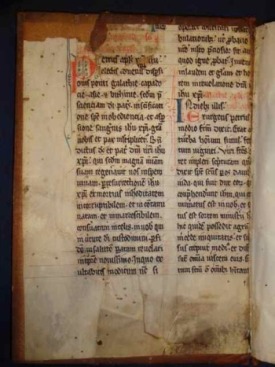"The Beauty of a Gentle and a Quiet Spirit" -- 1 Peter 3:1-7
 Tuesday, March 8, 2016 at 10:14AM
Tuesday, March 8, 2016 at 10:14AM  The Sixth in a Series of Sermons on 1 Peter
The Sixth in a Series of Sermons on 1 Peter
Christians in American do not face the same kind of persecution which Christians among Peter’s first century audience were facing. Many of those to whom Peter was writing were forcibly displaced from their homes and land by an edict from a previous Roman emperor Claudius, because they refused to worship pagan deities, and refused to consider the Roman emperor to be a “god.” Peter speaks of these struggling Christians as elect exiles and describes them as a chosen race. The Apostle is writing to remind them of their living hope and sanctification in Christ, which will help them cope with the very difficult circumstances which they were then facing. Peter’s original audience experienced open hostility from their government and their pagan neighbors. The opposition we face is much more subtle, but no less dangerous. In the thoroughly secularized America in which we live, we are not persecuted so much as we are pressured to conform to non-Christian ways of thinking and doing. Peter’s discussion of the relationship between husbands and wives will expose some of these non-Christian ways, and challenge us how to think of this foundational relationship within human society in the light of God’s word.
In a lengthy section of his first epistle (vv. 2:13-3:7), Peter is addressing specific societal relationships held in common by Christians and non-Christians–elements of the unwritten but widely accepted “household code” which defined many of the social relationships within Greco-Roman society. These relationships include the authority of civil government, the relationship between slaves and masters, and the relationship between husbands and wives. All of these fall under the heading of what we now call natural law. Although Christians and non-Christians both value these social institutions, God has spoken about these same relationships in his word, and so Peter is writing to do two things: 1) To remind his hearers that Christians do indeed regard these relationships as the foundation of society just as do Greco-Roman pagans, and 2). To correct whatever misconceptions his Christians readers/hearers may have regarding these relationships in light of God’s word.
When we study a letter such as 1 Peter which is filled with imperatives and commands, we must remind ourselves that these imperatives are given to Christian believers whom God has caused to be born again and who already have been set apart (sanctified) by God through the sprinkled blood of Jesus to live lives of holiness before the Lord. The imperatives of 1 Peter are given to Christian believers so as to identify themselves as citizens of a heavenly kingdom who look forward to a heavenly inheritance even while they dwell in the civil (or common) kingdom. Christians distinguish themselves from non-Christians through our doctrine (our profession of faith in the triune God who sent his son to save us from our sins) and in how we live our lives–we fix our hope upon Jesus, we live holy lives which reflect the holiness of our creator and redeemer, and we live in the fear of the Lord, because the one we invoke as our Father is also judge of all the earth.
In the first half of chapter 2, Peter exhorts his readers to keep their conduct honorable before the Gentiles who are persecuting them, so that those who speak evil of God’s people will be silenced and forced to give glory to God on the day of judgment. Christians must realize that the pagans who distrust them are watching how Christians conduct themselves. Peter is concerned for church’s witness to the saving work of Jesus Christ, as well as with discrediting those false accusations pagans were making against Christians–i.e., that Christians reject all civil authority because they do not worship Caesar.
To read the rest of this sermon, Click Here


Reader Comments